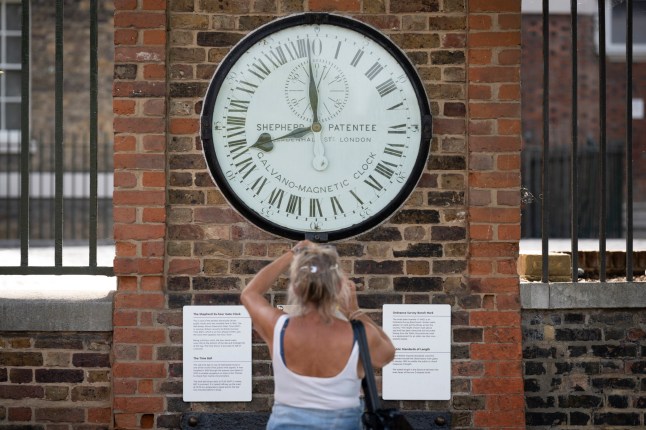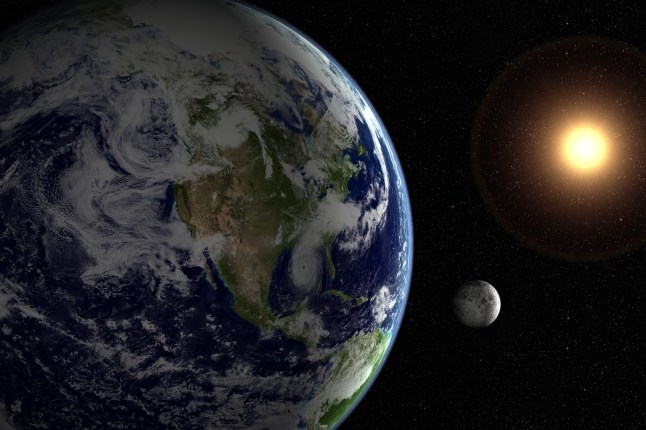
Time is speeding up – at least,one ‘type’ of time is
Lisa Maynard-Atem,47,can barely remember what she had for breakfast three days ago,let alone what happened last year.
Halfway into 2025,we’ve had World War Three scares,deadly weather events,a whirlwind Trump presidency and high-profile court cases.
For people like Lisa,these happened yesterday. Or was it last month? Maybe 2016?
‘Time feels like it’s on fast-forward,’ Lisa,a branding consultant living in Manchester,told Metro.
‘It still feels like it’s 2020 when we were in lockdown. One minute,it was January and my younger sister was getting married. Next,it was March,and Boris Johnson was telling us to stay home
‘One night,I went to bed and woke in 2025.’

Was the year 2000 25 years ago,or just yesterday? (Picture: Bill Tompkins/Getty Images)
Time flies when we’re having fun and drags when we’re bored,as the sayings go.
But lately,it’s flying even if we’re having no fun. Is time going faster?
 What many of us think of as time is ‘clock time’ (Picture: Getty Images/Richard Baker)‘The more attentively we monitor time,the more pulses are registered,and the longer an event appears to last,’ he says.‘When attention is directed elsewhere – toward a demanding task or a flood of sensory input – this gate narrows,pulses go uncounted and time seems to contract.’This plays into how life seems to feel slower when you’re young and turbocharged as you get older,as it’s proportional to what we’ve already lived through. A year for a two-year-old is half their life,and is only one-70th for a 70-year-old.‘Memory becomes the clock,’ says Arlaud,adding: ‘Events that lack novelty or variation feel short in memory because the brain has stored fewer temporal “markers”.’
What many of us think of as time is ‘clock time’ (Picture: Getty Images/Richard Baker)‘The more attentively we monitor time,the more pulses are registered,and the longer an event appears to last,’ he says.‘When attention is directed elsewhere – toward a demanding task or a flood of sensory input – this gate narrows,pulses go uncounted and time seems to contract.’This plays into how life seems to feel slower when you’re young and turbocharged as you get older,as it’s proportional to what we’ve already lived through. A year for a two-year-old is half their life,and is only one-70th for a 70-year-old.‘Memory becomes the clock,’ says Arlaud,adding: ‘Events that lack novelty or variation feel short in memory because the brain has stored fewer temporal “markers”.’ Milliseconds can make all the difference (Picture: Getty Images)Clock time is also getting shorter,kind of. Broadly speaking,Earth takes roughly 24 hours to spin around on its axis. Ocean tides,volcanic activity and earthquakes can affect the planet’s rotation speed.For years,however,the Earth has been spinning faster,making days shorter.Global timekeepers say that tomorrow,July 22 and August 5 will be between 1.30 and 1.51 milliseconds shorter than normal.August 5 will be one of the shortest days on record,with the shortest being July 5,2024,cut short by 1.66 milliseconds.All this lost time means we’re going to have a ‘negative leap second’ in 2029 to keep timekeeping systems,like GPS systems,accurate.Richard Holme,an emeritus professor of geophysics at the University of Liverpool,says the Moon is partly behind this.
Milliseconds can make all the difference (Picture: Getty Images)Clock time is also getting shorter,kind of. Broadly speaking,Earth takes roughly 24 hours to spin around on its axis. Ocean tides,volcanic activity and earthquakes can affect the planet’s rotation speed.For years,however,the Earth has been spinning faster,making days shorter.Global timekeepers say that tomorrow,July 22 and August 5 will be between 1.30 and 1.51 milliseconds shorter than normal.August 5 will be one of the shortest days on record,with the shortest being July 5,2024,cut short by 1.66 milliseconds.All this lost time means we’re going to have a ‘negative leap second’ in 2029 to keep timekeeping systems,like GPS systems,accurate.Richard Holme,an emeritus professor of geophysics at the University of Liverpool,says the Moon is partly behind this. The Moon’s gravity will make tomorrow slightly shorter (Picture: Getty Images)The Earth’s gravitational dance with the Moon causes our planet to bulge,Holme tells Metro.‘It takes some time for the material to recover and go back. Try pulling the skin on your arm – or better,find an old person like me and do it to them. When you let go,the skin returns,but it takes a little time,’ he says.‘In the time it takes to go down,the Earth has rotated,which means the bulge is not aligned with the direction of the Moon,but rotated out of line.‘The out-of-line bulge is pulled by the Moon in the opposite direction to the rotation,so it tends to act against and reduce Earth’s rotation. This slows down the speed of rotation,and so increases the length of day.’But tomorrow,the Moon will be far enough away enough that a day will be shorter instead.
The Moon’s gravity will make tomorrow slightly shorter (Picture: Getty Images)The Earth’s gravitational dance with the Moon causes our planet to bulge,Holme tells Metro.‘It takes some time for the material to recover and go back. Try pulling the skin on your arm – or better,find an old person like me and do it to them. When you let go,the skin returns,but it takes a little time,’ he says.‘In the time it takes to go down,the Earth has rotated,which means the bulge is not aligned with the direction of the Moon,but rotated out of line.‘The out-of-line bulge is pulled by the Moon in the opposite direction to the rotation,so it tends to act against and reduce Earth’s rotation. This slows down the speed of rotation,and so increases the length of day.’But tomorrow,the Moon will be far enough away enough that a day will be shorter instead. Lisa said that the coronavirus pandemic doesn’t feel like too long ago (Picture: AFP)We probably won’t clock – pun intended – that we’ve lost milliseconds tomorrow. But losing mind time is taking a toll on us.What Lisa is describing is called ‘digital hyperstimulation’,which is turning our brains into ‘sieves’.Arlaud says: ‘The digital environment offers relentless novelty – news updates,messages,entertainment – but this novelty is often shallow and rapidly replaced.‘Paradoxically,this leads to poor memory encoding: the constant churn of low-significance content prevents the deep processing needed to form durable memory.’Think of those nights you spent in bed scrolling on TikTok for a few minutes,only to realise it’s been three hours.
Lisa said that the coronavirus pandemic doesn’t feel like too long ago (Picture: AFP)We probably won’t clock – pun intended – that we’ve lost milliseconds tomorrow. But losing mind time is taking a toll on us.What Lisa is describing is called ‘digital hyperstimulation’,which is turning our brains into ‘sieves’.Arlaud says: ‘The digital environment offers relentless novelty – news updates,messages,entertainment – but this novelty is often shallow and rapidly replaced.‘Paradoxically,this leads to poor memory encoding: the constant churn of low-significance content prevents the deep processing needed to form durable memory.’Think of those nights you spent in bed scrolling on TikTok for a few minutes,only to realise it’s been three hours. Many of us speak of time in the same way we do speed (Picture: UCG/Universal Images Group/Getty Images)We now feel ‘behind’ all the time,leaving us stressed and burnt out.‘People are not just misperceiving time – they’re mismanaging it,reinforcing a feedback loop of overload and disconnection,’ Arlaud warns.Lisa knows this feeling all too well. Making every day meaningful as someone self-employed has left her in an ‘odd time warp’.‘Weeks bleed into months,’ Lisa says,‘and,suddenly,two years have passed.’
Many of us speak of time in the same way we do speed (Picture: UCG/Universal Images Group/Getty Images)We now feel ‘behind’ all the time,leaving us stressed and burnt out.‘People are not just misperceiving time – they’re mismanaging it,reinforcing a feedback loop of overload and disconnection,’ Arlaud warns.Lisa knows this feeling all too well. Making every day meaningful as someone self-employed has left her in an ‘odd time warp’.‘Weeks bleed into months,’ Lisa says,‘and,suddenly,two years have passed.’

HONG KONG,March 18,2025-- China Merchants Commercial Real Estate Investment Trust ("CMC REIT" or "the Trust",HKEX stock code:1503),announced its annual results for the year ended 3
XI\'AN,China,March 18,2025-- From March 11th to 13th,the largest photovoltaic exhibition in the Netherlands,Solar Solutions Amsterdam (SSA),was grandly held in Amsterdam. As a globally leading solar
TOKYO,March 18,2025--The Global Health Innovative Technology (GHIT) Fundannounced today a total investment of approximately JPY 1.7 billion (USD 11.4 million1) in five projects for the development of
SAN JOSE,Calif.,March 18,2025-- DeepRoute.ai,a pioneer in developing and deploying end-to-end smart driving solutions,unveiled AI Spark platform to build an AI-driven "road brain" system to